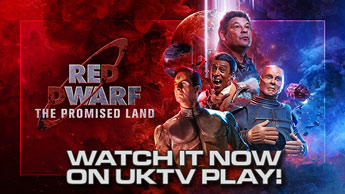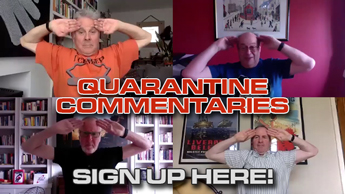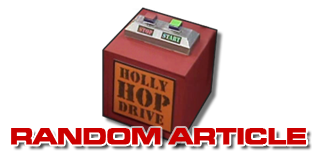 |
Flibble Century Mr Flibble gets very cross for the 100th time - this time with Red Dwarf co-creator Doug Naylor! |

Andrew Ellard
Mr Flibble had prepared some Shakespeare for his audition with Doug. Andrew had to break the news - he's not here to audition. And, to be fair, how good was it going to be once Andrew had translated his whispers into the necessary 'forsooths'? Instead, the interview got cracking - what are the best and worst parts of SERIES I for you?
Best bits are we sold it! We actually got it on! After three years, then the electricians strike knocking us out during rehearsals, and then it being remounted. At one point it seriously looked like it wasn't going to be remounted. Aspects of making it are always scary when you do a first series. You're mostly working with people you don't know, so you don't know what's going to work and what isn't.

I was desperately disappointed - as I think I may have mentioned once before (laughs) - with the overall look of the series, the low production values. That came as a genuine shock, because I'd been promised that it was going to look... well, way better than that.
Casting was interesting. I remember talking to [TV producer] John Lloyd before we started the series, and he said, "Please don't cast 'the regulars', I'll be really disappointed to discover Lister's Hugh Laurie, for example. Cast unknowns, so it's really fresh."
And then, at the end of the series, I spoke to John again - and he didn't actually say 'why have you cast those two idiots?' but the implication was [that]. (Laughs) He said, 'I like the opening titles, that was great but then... I think you need at least one new character...'
I do remember walking down Denmark Street, just after the series had been aired, toward a producer friend who saw us and crossed the road. He'd obviously seen the show and didn't know what to say. Still, it was all character building. (Laughs) The general consensus within that small group of people in the business we knew - and this was so totally unfair - was that it was well written but that the casting didn't work. Often they were people who had read the original script and thought it was smart and unusual, and then, when they saw what it had become, were very disappointed.
How did the cast and crew work on-set?
Craig, in the first series, had a nasty habit of throwing things in that nobody had ever seen before during rehearsals. That sequence [in The End] when he trips Chris up, that was just thrown in on the night. Sometimes the cameras, not knowing that these were going to happen, would miss things - so it was quite a tricky patch-up job sometimes. 'Have we got a shot to get from here to here to cover up that thing nobody knew was going to happen?'
I remember being allowed to sit in the edit. It was a really strange situation, because on Spitting Image we were in the heart of it, but on Red Dwarf we were 'allowed' in rehearsals, but it was very much 'you are allowed in rehearsals.' 'You're allowed in the gallery,' except Rob didn't want to be in the gallery because he wanted to smoke. (Laughs) I'd be in the gallery and Rob would be outside somewhere pacing and smoking 40 fags.
I would sit behind the director and not say anything - I was allowed to make three points, but had 33 [I wanted] to make.
Because it was a privilege they might take away...
Absolutely right - and once you'd lost it, you'd lost it forever. There was a real terror that writers would interfere, or have stand-up rows with directors, and the whole system would just fall apart. Because I sat there like a good boy and only made three points - most of which were quite intelligent... well, two out of three were anyway - I was allowed to stay. Also, of course, it was a fantastic education of how the whole editing system worked.

I saw the effect an edit can have on a show. It's such an important stage. You change a bad show into a good show and a good show into a bad show. It's writing, really, in many ways. You can change the story around. But then the frustration was that it was linear editing. So if you wanted to change anything, you had to go right back to the beginning and do it all again. Sometimes, if it was a really serious thing, and it took days and days, you wouldn't go back, you'd just lose a [tape quality] generation. And there are only so many you can lose before it looks like absolute crap.
How did things progress for SERIES II?
We were commissioned for a second series - but then there was a whole mess of 'it's on, it's off'. Paul Jackson phoned us up, I think, three times to tell us to stop writing because it was off - and then we would just down tools and go to the pub. Then he'd phone two days later and say, 'It's on again.' It's quite hard then to get your enthusiasm back - you're a bit sort of 'will it be off again?' Well, that's my excuse for the scripts always being late... (Laughs)
Alan Yentob took over as controller of BBC2 and his comment was, 'Can you get them off the ship sometimes?' This was something we wanted to do anyway, so we were quite happy about that. We'd asked the BBC not to repeat Series I because we thought it would do more harm than good. We thought we could make II much better quite quickly. I don't think either of the guys were crazy about their performances either. I think Craig was particularly critical of himself.
In the first series we had trouble getting the studio audience, and we had to go literally to the pub and grab people, going, 'We're making this comedy show over the road at the BBC please will you come and see it?' Danny got into a taxi and somebody said, Hey, are you famous?'And I remember saying:' No but he will be in about five weeks.' (Laughs) Series II was different. For Series II we had an audience. They knew the characters, and so there's a big difference between the laughs in Series I and Series II. There's a fan base there.
I remember it being a really 'big laugh' audience - and you do get addicted to that. You tend to judge the shows by how much the audience laughed. If they laugh their heads off, you really feel pleased... and if they don't laugh so much you kind of want to blow your head off.
We were involved more - I was asked to do paper edits of what I wanted cut. I'd talk with Rob about those, but he wasn't so interested in that side of it. With Series II, there's no question that we felt it was better, that things were working better - although there was still some way to go. It had become something we hadn't anticipated it becoming - we thought it was going to go off here (points), and in fact it went off there (points in a very different direction), and it would eventually develop into something else. But nevertheless it was on its way, without having actually arrived yet.
Mr Flibble said that, if Shakespeare wasn't quite what Doug was after, he could always try mime. Doug relented, and sat through ten minutes of what looked remarkably like a penguin walking around in a room. Thankfully, the conversation moved on to SERIES III.
We were producers on Series III. Ed had tried to get [set designer] Mel Bibby on Series I and he wasn't free, but he was for Series III, so Mel came on board and [costume designer] Howard [Burden] came in too. So the look of the show improved immeasurably very quickly - not that that's everything.
When we came back for Series III we repeated Series II, and Paul Jackson was very excited because the ratings for the repeats were the same as the originations. I was like, 'So?' But he said, "No, no, this is really good. It means the audience is building." I was thinking 'who cares, only two and a half million are watching it.'

We put Backwards out first, I think, because Paul Jackson thought it would be a really good gimmick, that it would get a lot of press. He didn't feel - and he rarely interfered in the edit - that we should have the Star Wars [text crawl] thing. He thought we should go straight into the show. But Ed and I had spent ages doing the new opening titles thinking, 'This looks really cool.' So we kept them.
Did the responsibilities of producing make yours and Rob's schedule tougher?
The Last Day was a really scary thing. There was another element of 'it's on, it's off', so not all the scripts were written. We started making the series and we hadn't written the last show - and we weren't getting any ideas, either. Because the shows were more complicated, we needed to be around more - but the weeks were ticking by.
So the only show I've never attended on the night was Backwards - Paul Jackson, very sensibly, said, "Guys, you've got to go off and write a show." We thought we could do it in the evenings after rehearsals, but we were so tired that we couldn't get any ideas! So while they left to go up to Manchester to record Backwards we went back to Rob's place to write a show with the intention of having it ready for the following Monday. But we were both completely blocked - couldn't think of a thing. We got into Rob's car - and it was really weird. By the time we arrived at Rob's house we [had it]. The pressure was off and we just went in and wrote it over two, three days.
Rob was always a great believer in 'the script is everything and nothing else matters'. If the script's good, the show will be good, and it doesn't matter what people think - it doesn't matter if they think we're useless and we're always late - no-one will remember that, they'll only remember the show. And if the show's good they'll forget how late the script was. And in a sense he was absolutely right. It was a great life lesson for me learning not to care so much about what people thought of us. Plus, to be honest, most of the scripts were late because we cared about them so deeply we'd be re-writing them long after most sane writers would have had handed them in.
SERIES IV followed on quite straightforwardly from III. What kind of changes did happen?
We wrote that series in a house, we were locked away. I think Chris had said he wanted to try something different. It was wearing playing Rimmer all the time - and he'd possibly started Brittas - never having any positive side. So that's where Ace came from.
And Robert came out of his makeup...
Yeah, because he wanted a break from the mask. We're just so amenable - whatever you want, we'll do it! (Laughs) He wanted to work with his partner, Judy Pascoe, so we put her in too. (Laughs) The first of the series, Camille went out on Valentine's Day, We thought it would get more attention that way and sure enough it did. I remember getting on a plane to go on holiday and reading the reviews which were mostly very good and thinking; 'Good reviews, we're establishment now - it's over.' Originally, we were going to start with Meltdown, I think.
The schedule was altered because of the Gulf War, of course - but in the end Meltdown wasn't reviewed well anyway.
Meltdown was absolutely hated. But only by the fans. (Laughs) I didn't understand it. We liked it; I thought that Elvis thing - where they're all running along singing the song - was just so funny. Being there on the day, seeing all these people go to war, I thought it was a really funny idea. I don't get [the reaction] at all.
Mr Flibble started to get pretty angry about a review he received in 1991 bemoaning his 'two-tone performance' as Polonius. He repeatedly reminded Andrew and Doug about his beak, which is yellow, which makes any performance he gives at least three-tone. Andrew, meanwhile, asked Doug about SERIES V.
There was maybe more drama in it. I suppose that was just us being more able to sell those stories, to get people to do them, and being more ambitious because we'd been doing it in stages.

For Series V [director] Juliet [May] came in. When we went into Series V, we wrote Back to Reality first. I remember Paul Jackson thought we were going to change the whole series, that the rest of the series was going to be this new scenario. We didn't shoot it first. We shot Back to Reality last, and we shot Quarantine second to last - although we shot some of the location stuff first. Juliet left, and then we [Rob and Doug] took over as directors. There was a lot of discussion about whether we should put it out first - because we thought it was the strongest show - or last.
I remember shooting the sequence with Timothy Spall to absolute silence [from the audience], and Rob turned to me and went, "What the hell do we do now?" I said, "The audience are in shock. They can't believe what they've just seen. Let's shoot it again, see what happens. It can't be any worse!" (Laughs) Then they did laugh.
After the wrap party, the entire crew needed to reassemble for a pick-up shoot - which must have been fairly horrible.
We had to re-shoot sequences, in a day, for the entire series, because there were all sorts of sequences that hadn't worked when they had been shot first time round. It was just 'stand there, do a line, do that'. We had to do so much so quickly - all the stuff with Kryten going bonkers and hitting his head on a pillar. It was all re-shot, using all the standing sets. It was the fastest shooting we've ever done for any series.
The camera guys were really protective of us. I remember Rob was shooting the car park sequence with Lenny Van Dohlen - while I was in the edit preparing the play-in stuff for the audience and discovered he'd crossed the line.
[Mr Flibble's Education Corner: The 180-degree line is a theoretical point that the camera can't go past without making the shots clash in the edit. If you shoot Lister facing right, but also shoot Rimmer facing right, in the edit both characters look like they're facing the same way on-screen, rather than at each other.]

So we had to re-shoot, but that planted in the mind of the cameramen that we didn't know when we were crossing the line or not. So when were doing that shoot on the final day he was constantly saying, "You're crossing the line, you're crossing the line!" (Laughs) But by then we'd got the hang of it and we weren't.
What kind of experiences did you apply to SERIES VI?
We'd been to the States and worked with the Cheers guys, and we decided to try to write really gag-intensive shows. So we put it all in Starbug and wrote a much more bang-bang-bang kind of series - certainly for the first three.
With Gunmen of the Apocalypse we had a rough idea we wanted to write a cowboy show. But before we wrote it we wanted to make sure there was somewhere we could shoot it. You couldn't just sit down and write a cowboy show and with our budget expect it to look any good. So we told everyone we'd written it, to see if they could find a suitable location, expecting the answer, 'Sorry, we couldn't find anything.'
Next thing we know they ring and say they've found the perfect place - a western town in Kent that this cowboy society use as a weekend retreat and to bring the script because we're going on a location recce. We go, 'Script needs a few tweaks before it's ready for release but we'll talk you through it when we get there.' So then we had to talk them through this script that didn't exist. (Laughs) I remember saying 'there's this big shoot out in the street. Good guys that end and bad guys that end and then we go into the jail, Lister and Rimmer chat and there's this big scene in the saloon and a fight with knives... right, Rob?' And Rob's, 'Knives, big fight, absolutely.'
There was a good end piece to that story. Janet Street-Porter was the Commissioning Executive for the BBC for that series and she called in Charles Armitage who was our agent and one of the directors of the production company and said, "I've just read that bloody Gunmen of the Apocalypse. How the hell are they supposed to shoot that on their budget? Tell them to start again and come up with a script that's not so stupidly expensive." Charles said, "That's going to be really difficult because they just finished shooting it yesterday."
Justin Judd was the producer on that one. When we were being shown around one of these whacked out [cowboy] guys came in with a gun and said "Howdy Pardner" and fired this gun just behind his ear and made him deaf for a week! We sent him off to listen to Janet's next piece of advice after that.
Mr Flibble suggested that, if you ever wanted any additional spending approved, that would be the ear to ask. Andrew asked how Doug felt about cutting Holly from the show.
We were always in the position of finishing the show and then going, 'Hattie hasn't got much of a part again.' So throughout the rehearsal we'd be going, 'We're definitely going to give you some more lines, Hattie', But it rarely happened.
I really like Hattie's stand-up, and I think she's lovely and funny. But we just couldn't get it for her. Also, Paul Jackson might well have been right when he said that Kryten had taken Holly's role, so there were two characters doing the same thing.
Didn't the script Out Of Time arrive late, leaving little rehearsal time?

Late scripts - cue-card acting. The empire was crumbling. (Laughs) But Tony Hancock in The Blood Donor did all of that off cue-cards, and that's a classic. So that's no excuse.
Why was the script given the working title of RIP Dave Lister?
That was because we'd heard a story that Craig was going around, as the first half came in, saying, "Is it me, or is this script absolutely shit?" (Laughs) So we thought, 'Okay, lets call it RIP Dave Lister and kill him - before bringing him back - knowing that he was going to get the script in bits. So at least he'd be worried for a bit. And he was. (Laughs)
Mr Flibble enjoyed talking to Doug, and now he's been cut short... Mr Flibble's very cross.














